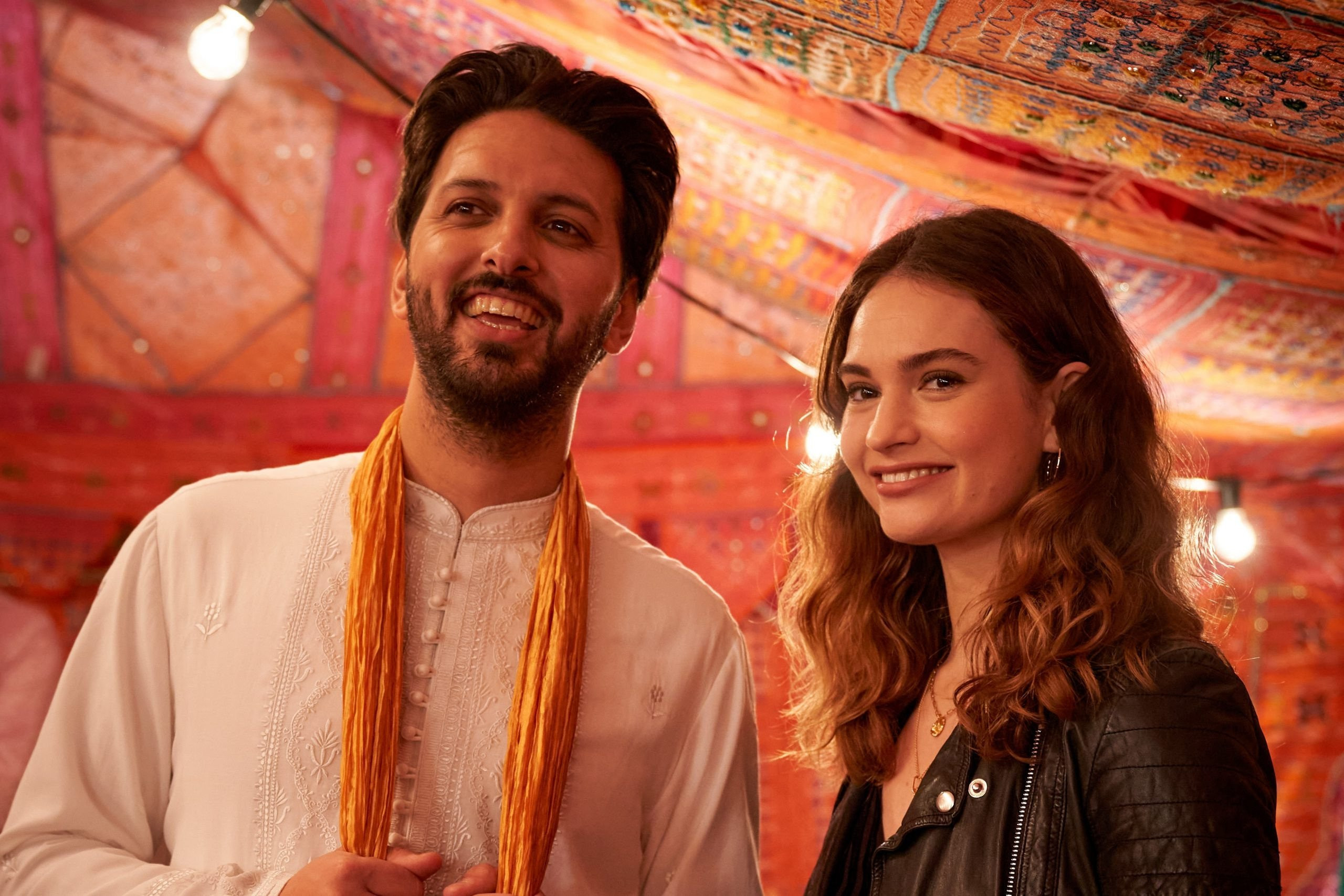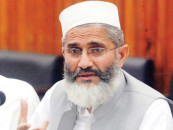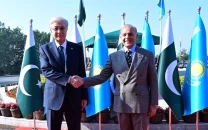A double bill, desi style
Following the success of Maula Jatt & Joyland, two Pak-inspired films are entertaining with poignant social messages

Last year was a good one for Pakistani films (Joyland, Maula Jatt) so it’s only fitting that this year we’ve already been treated to two Pakistani-inspired ones ― Polite Society and What’s Love Got to Do with It?
Polite Society sounds like a dour documentary about etiquettes but don’t worry it’s a delightful camp comedy with a mish-mash of genres thrown in: think coming-of-age drama meets kung-fu meets desi wedding sheninigans. If only the title would reflect that. The film’s plot revolves around two British-Pakistani sisters in London. Ria Khan (newcomer Priya Kansara) is a hot-headed high schooler and aspiring stuntwoman ― she pens confessional updates to Eunice Huthart, a real stuntwoman, begging Huthart to be her mentor. In her free time, she cajoles her sister, Lena, to film her performing flying kicks and spins to upload online. Lena (Ritu Arya) an art-college dropout who mopes around, blurry-eyed, in pulled-up hoodies and sweatpants, is only too happy to oblige.
Ria and Lena clearly share a close bond and, to Ria, her world is perfect ― that is until her sister becomes engaged to the very eligible Salim Shah (Akshay Khanna), a handsome doctor from a rich family whose matriarch Raheela, played by the ever-talented Nimra Bucha, has been looking for a suitable girl for her ladla beta for a while. Everyone from the diaspora community will know a ‘Raheela’: that uber-wealthy aunty who is always the hostess with the mostest and for whom no one is good enough for her son ― ever. Bucha deliciously plays up the sneering, evil mother-in-law to be with a perfected cackle to boot. This role follows one in Ms. Marvel, where Bucha also potrayed the villain with much aplomb; clearly the actress has a knack for such characters.
Alas, for Raheela, she has met her match with Ria, who is determined to stop this betrothal by any means necessary. As if on cue, her two sidekicks, Alba (Ella Bruccoleri) and Clara (Seraphina Beh) appear, ready to hatch crazy plans to sabotage the relationship. The trio bring much zaniness and comedy to every scene they share together and have great chemistry. The more Ria fails to discover anything sinister about the Shahs (which she is convinced there has to be), the bolder and more outrageous her plots become. Ria is so hell-bent on her scorched-earth tactics that she refuses to see what is clear to everyone else: Lena, the ‘black sheep’ of the community, is happy to have found love and that, too, with the most eligible bachelor in town.
The parents (Shobu Kapoor and Jeff Mirza), low-key and down-to-earth, watch all this drama unfold from a distance ― they’re amused but confused. Thankfully they break the desi stereotype of parents nagging their children to become doctors or engineers and get married; no overbearing trope is trotted out here. Of course that doesn’t stop them from using their relative generosity to swat away any annoyances. “I sent her [Lena] to art school, didn’t I?” quips the mom at one point to Ria as she protests immaturely about her sister’s upcoming betrothal. Plus, her daughter snagged a doctor ― even if she didn’t become one. What’s not to be happy about?
As the manic plot of Polite Society careens towards its explosive ending, it turns out that Ria may not just be a possessive teenager with a wild imagination; the ending may be too cartoonish or hyperbole for some but there is something to be enjoyed about the zany commentary on the often absurd dyanmics between mother-in-laws and their bahus.
Fast-paced and frenzied, Polite Society is visual treat with its blend of martial arts, hijinks comedy and desi references. In the climatic ending, South Asian aesthetics meets kung-fu, and we get to enjoy a big, fat desi wedding with lots of flying kicks and karate chops in glittery lehengas and peshwases in eye-popping colours. If shaadis led to such thrilling twists, I’d gladly wait till the bitter end when dinner is served (aka as the cue that it is ok for guests to bid adieu). As Kansara aptly put in an interview with The Guardian, “Haven’t we all wanted to kick an aunty at one point?” Haven’t we indeed.
In any other filmmaker’s hands, Polite Society, would be weighed down by its subject matter – a look-at-how-regressive-South-Asians-are trope. But Pakistani-British writer-director, Nida Manzoor, who rose to prominence for the witty We Are Lady Parts, an award-winning comedy about a British Muslim punk band that dismantles every Islamophobic and Orientalist trope in the book , manages to sidestep the stereotypes here too. Clearly there is a space ― and need ― for stories that reflect the complex narratives of South Asian and Muslim women. If only Pakistani producers, hell-bent on feeding us Hum-TV inspired blandness of bechari bahus and villanious saases would get the memo.
What’s Love Got to Do with It?is Jemima Khan’s (the ex-wife of an ex-prime minister) latest venture. The film is as paint-by-numbers as Polite Society is manic and entertaining. Khan wants us to know that arranged marriage isn’t what Westerners think it is ― Princess Diana had an arranged marriage quips one character (Khan should know; she was good friends with the royal). It’s no longer ‘arranged’, merely ‘assisted’. Sadly, most couples in What’s Love Got to Do with It? are assisted into heartbreak.

Zoe (Lily James) is a documentary filmmaker who prefers serious subjects such as honour killings. Unfortunately for her, her producers find her topic choices too dour; fortunately for her, her childhood friend and neighbour Kaz (Shazad Latif) provides the next successful pitch. He’s thinking of going the traditional route, she trills, and helpfully even provides the catchy title ― ‘Love Contractually’.
Now if only Kaz would agree to it ― which he hasn’t but will do so, after a predictable montage of Zoe begging her friend with all kinds of scenic London shots playing in the background. Cue the trip to the marriage bureau where the matchmaker (Asim Chaudhry), a sober matter-of-fact man, proceeds to ask awkward questions about what Kaz desires in a soulmate. A risqué joke about dogs and doggy style ensues. At that point one would think that Kaz would prefer to die single than tell his parents about his sexual proclivities. Thankfully for him, his mother (played by the understated Shabana Azmi) and father (Zahid Khan) seem to not understand the sexual innuendos ― or at least pretend not to.
More awkwardness follows: an awkward social mixer, an awkward Zoom chat with a potential bride-to-be whose family dutifully pops up like a jump scare from a horror movie – Kaz’s family returns the favour. And then an awkward trip to Lahore, where the bride-to-be, the law student, Maimoona (the brilliant Sajal Aly) – and a big, fat desi wedding – awaits.
Zoe, meanwhile, is having an awkward moment of her own: her best friend, Helena (Alice Orr-Ewing) has been cheated on by her husband and now she broaches any man she knows with the same question: “Would you cheat on your wife?” “Why not?” The answer is important because, as we all know, all cheaters know they will be cheating way ahead of time, and serial cheaters always answer truthfully. Don’t they? Her friend’s heartbreak sends Zoe into a tizzy and a blur of one-night stands ― until she finds herself to be the person cheated with. Thankfully, she’ll be on a plane to Lahore soon where she can avoid all sleazy men and focus on who she’s meant to end up with: Kaz.
Sadly, there is one prominent guest, missing from Kaz’s big, fat wedding ― his sister, whom the family has shunned because she married a white man. Could this be the reason Kaz feels the need to go for an arranged marriage despite his obvious rapport with Zoe? Because he doesn’t want to end up as the one-who-must-not-be-mentioned? Kaz is not one to question his feelings so we’ll never know.
On the bright side, this means we get to walk through some fun, wedding celebrations where Zoe’s mother, played by the delightful Emma Thompson, sashays around in glittery, glitzy shalwar kameezes and where Maimoona parties the night away. “Let her go, now the real fun can begin,” she says gleefully after the martriach of the family, a hectoring nani jaan, comments that the bride and her friend’s clothes are too fahash at the mehndi function. As rum and coke ― “it has masala” quips one of Maimoona’s friends to a wide-eyed Thompson ― and weed are passed around, it’s a delightful inversion of the Western cinematic stereotype that all Pakistanis are conservative bores. As anyone who has ever partied with a Pakistani (as Jemima most surely has) knows, we’re the biggest and craziest of the lot.
Suffice to say, there is a happy ending for everyone ― Zoe, Kaz, his sister, Maimoona ― and the twist is unconventional for rom-coms. Alas, it’s not as climatic as one would like. So what’s love got to do with it? Why everything!
Maliha Diwan is a freelance writer and a former literary and cultural editor. All facts and information are the sole responsibility of the writer.



















COMMENTS
Comments are moderated and generally will be posted if they are on-topic and not abusive.
For more information, please see our Comments FAQ